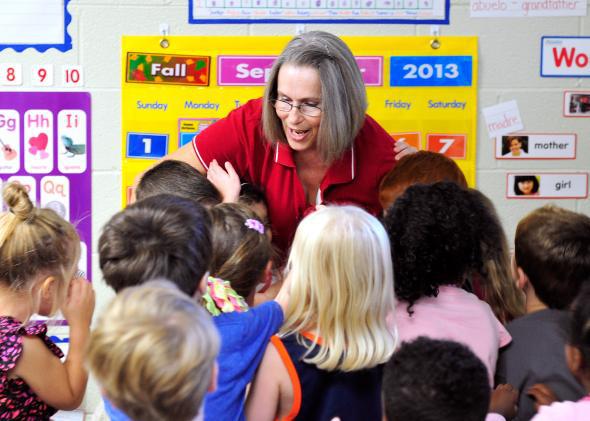Lyndon Johnson’s famous War on Poverty turns 50 this week, inspiring a glut of articles analyzing what’s changed about poverty in the past five decades. As Maria Shriver writes for the Atlantic, one of the biggest changes has been the face of poverty. No longer is it “images of poor children in Appalachian shacks and inner-city alleys.” Instead, it’s a “working mother dashing around getting ready in the morning, brushing her kid’s hair with one hand and doling out medication to her own aging mother with the other.” Nearly 70 percent of the 100 million Americans who live in or on the brink of poverty are women and children, she writes, so any future attempts to relieve poverty should start with women.
But what is it exactly that low-income women need? Liberals tend to trot out a long list of social programs, both existing ones that need to be beefed up (like food stamps and Temporary Assistance for Needy Families) and hypothetical ones that need to be invented (guaranteed work programs). Conservatives, on the other hand, tend to focus on the low marriage rates of low-income women and suggest that we need to “incentivize” marriage. Both conservative commentators and politicians like Rick Santorum and Mitt Romney have offered marriage as the magic bullet needed to save women from poverty.
Shriver had the mind to actually bother polling low-income women themselves, asking how they feel about things like education, marriage, and children. She writes:
Seventy-five percent of them wish they had put a higher priority on their education and career, compared to 58 percent of the general population
Seventy-three percent wish they had made better financial choices (as did 65 percent of all those we polled)
They were less likely to be married (37 percent, compared to 49 percent of all the men and women we polled) …
And more likely than men to regret marrying when they did (52 percent, compared to 33 percent of low-income men)
Nearly a third of those with children wished they had delayed having kids or had fewer of them
Emphasis mine. With that much regret about marriage out there, it seems like the solution of pushing women even harder to turn to men for financial support is a really poor idea. As I’ve said before, marriage itself is not enough. The marriages need to be happy, functional ones.
The high level of regret for not putting more emphasis on education and career early on suggests that what low-income women are really longing for is more financial independence. What we do know is that social spending is quite effective in helping women achieve that. As my colleague Matt Yglesias wrote in September, social spending helps first by relieving the immediate stress of poverty. But it also helps women get to the point where they don’t rely as much on social services to stay out of poverty. ThinkProgress interviewed one such woman, Rebecca Johnson, who is now a middle-class homeowner with a master’s degree but used to live in poverty. Government programs such as Medicaid and the Supplemental Nutrition Assistance Program kept her family afloat while she went to school and worked. Head Start relieved some of her child care expenses, and Pell Grants allowed her to afford an education.
While the most immediate concern is keeping Republicans from bleeding out important anti-poverty programs that already exist, it’s clear that we need more, including an expansion of government-subsidized early education and child care, which allows women to go to work and helps kids. As Shriver notes, 78 percent of Americans support government programs to increase access to affordable, high-quality day care. President Obama has already proposed a program to provide preschool education to 4-year-olds from low- and moderate-income families, citing the tremendous gains for children enrolled in these programs. It’s a good start, but what we really need is to make it a goal that every woman who wants to work has an opportunity to do so. That means making affordable child care available not just for 4-year-olds, but for all children, even infants, who have mothers who want to go to work.
